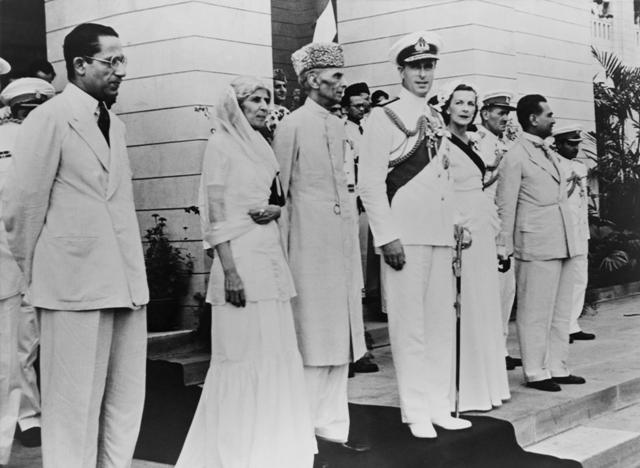 Mahomed Ali Jinnah in 1947 urged Pakistan "to ‘work our destiny in our own way and present to the world an economic system based on true Islamic concept of equality of manhood and social justice". [Photo: Everett Collection Inc / Alamy Stock Photo]
Mahomed Ali Jinnah in 1947 urged Pakistan "to ‘work our destiny in our own way and present to the world an economic system based on true Islamic concept of equality of manhood and social justice". [Photo: Everett Collection Inc / Alamy Stock Photo]
[This is an excerpt from an article in The Round Table: The Commonwealth Journal of International Affairs.]
Political-economic dimensions
A first step towards modernity requires dispensing with feudalism. Jinnah, however, never spoke of this nor took any steps towards this end and so, unlike in India, feudalism stayed and consolidated itself. The grand winners of Partition were feudal families to whom the British had gifted large tracts of lands in Sind, Punjab and the NWFP. In return for these land gifts, nawabs and khan bahadurs (feudal lords) had helped the British in collecting taxes from the peasantry. About 70% of those in the Second Constituent Assembly (1954–56) were feudal lords. Many grabbed the opportunity to seize evacuee property left behind by fleeing Hindus and Sikhs. A nominal agriculture reform committee of the Muslim League was headed by Mumtaz Daultana, the Oxford educated scion of a large landlord clan. Nevertheless, even according to his landlord-friendly committee’s report, more than 80% of the land in Sind, over 50% in Punjab, and slightly less in the NWFP was owned by big landlords. One individual owned a staggering 300,000 acres while the more usual holdings in Sind and Punjab were around 3000–5000 acres. A UNDP report released in April 2021 reveals that Pakistan’s feudal land-owning class, which constitutes 1.1% of the population, owns 22% of all arable farmland. This figure represents the present situation; in the intervening decades lands have been divided and subdivided between the generations.
Jinnah was ambiguous on another key matter as well: secularism and modernity go together and Jinnah was personally secular. His famous 11 August 1947 speech calls for separating religion from matters of the state. But at other times he called for an Islamic state governed according to the sharia. Addressing the State Bank of Pakistan, he demanded ‘banking practices compatible with Islamic ideals of social and economic life’ and to ‘work our destiny in our own way and present to the world an economic system based on true Islamic concept of equality of manhood and social justice’ How? Later years would see Pakistan’s economic direction wavering from the dictates of the Harvard Advisory Group to that of wizards running Imran Khan’s so-called Riyasat-e-Medina.
Special edition: Pakistan at 75
Introduction to special edition: India at 75
Modernity has traditionally been associated with the strengthening of national authority over all other forms of authority. But the Pew Global Survey reports that, ‘Among most of the Muslim publics polled, Muslims tend to identify with their religion, rather than their nationality. This is particularly true in Pakistan, where 94% think of themselves primarily as Muslim instead of Pakistani’. Weakened nationalism is not good news for those who believe in a strong state because it also leads to weakened trust in institutional and social mechanisms. Society needs a high level of trust to build and sustain an economy, develop science, and manage conflicts. In Francis Fukuyama’s terminology, this constitutes social capital.22 Where the national spirit is weak, social capital is small and trust horizons move inward towards family and tribe, away from stable and efficient institutions. Most importantly, God’s laws – as inscribed in the divine text – matter much more than the laws made by the national state.
Modern states have a monopoly of violence over their citizens with the state’s security forces operating lawfully under a legitimate civilian authority. Arguably this was more common during Pakistan’s early years rather than the later ones. Indeed the power of private militias operated by powerful landlords and tribal leaders has diminished and, with power mostly wrested back from control of Islamic groups such as the Tehrik-e-Taliban Pakistan (TTP), the state has managed to assert its authority. However, the state’s failure to act against groups such as Tehreek-e-Labbaik Pakistan (TLP) or powerful mullahs such Maulana Abdul Aziz of Islamabad’s Lal Masjid goes against this trend. Overall there is a lack of trust in the courts and the police system. This makes citizens vulnerable to intimidation, arbitrary arrest, serious criminal activity, and general fear of violence, oppression, and injustice. More fundamentally, state law is considered less important than religious law by a majority and so those crimes that are not specifically mentioned in the Qur’an are not seen as serious crimes. White collar crime, for instance, did not exist in ancient times and there are no specific injunctions against such things as insider trading, money laundering, cybercrime or cheating in exams. The orthodox would never miss a prayer or a day of fasting but see such crimes as minor infractions.
Pervez Hoodbhoy is a Professor of Physics and Public Commentator, Islamabad, Pakistan.



